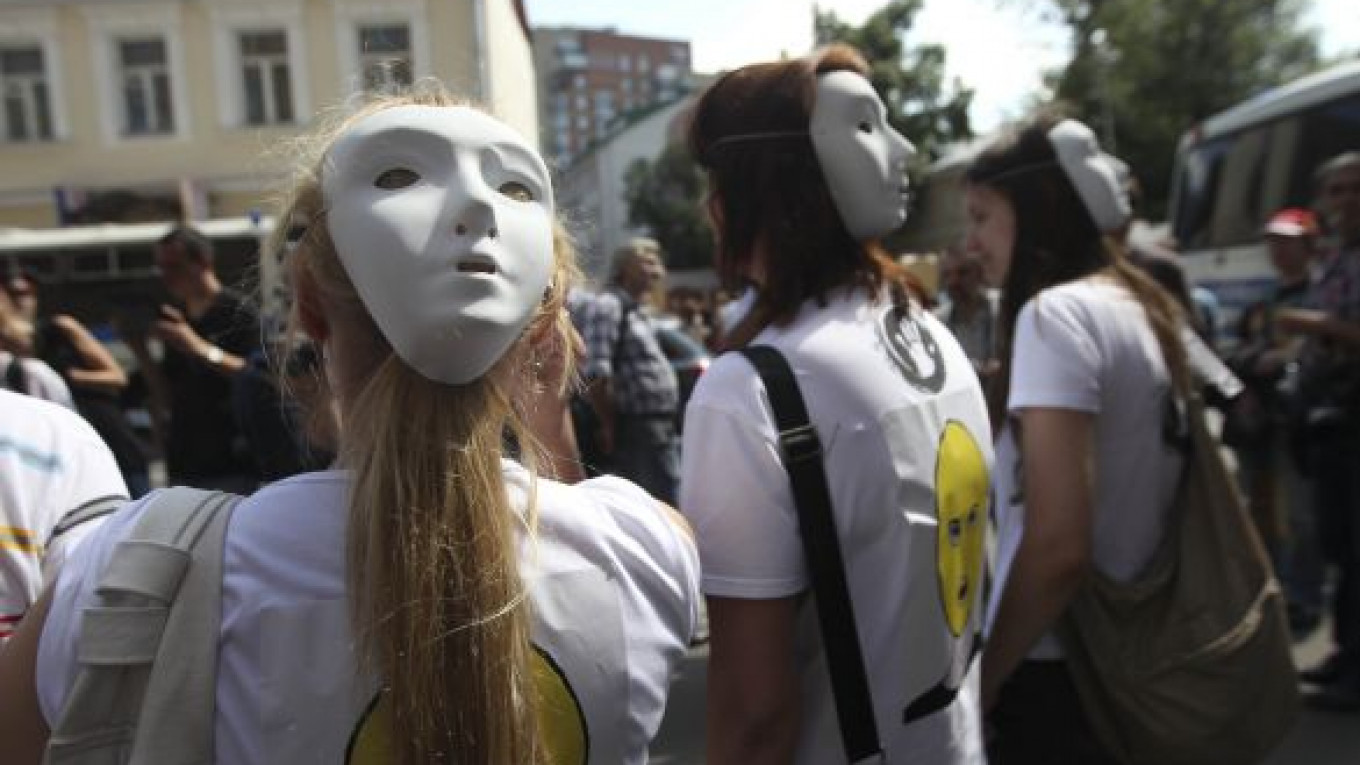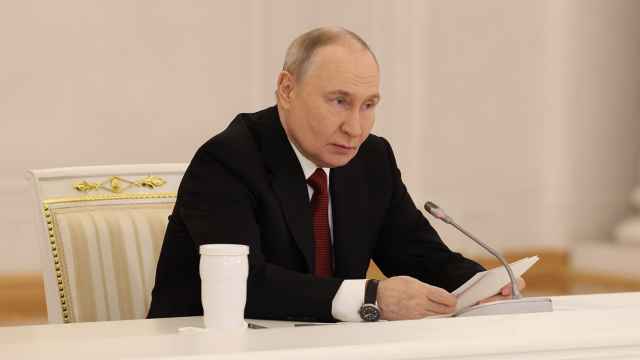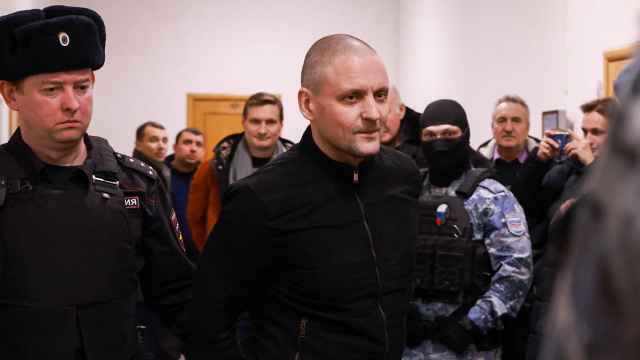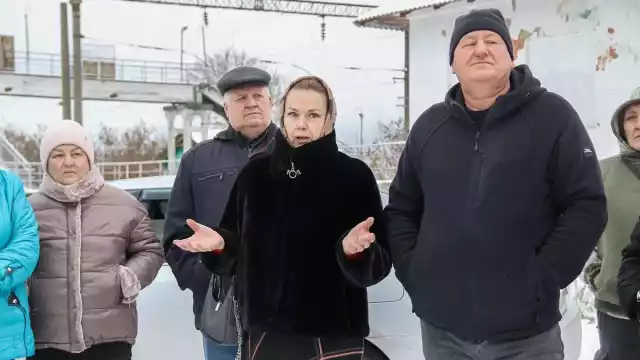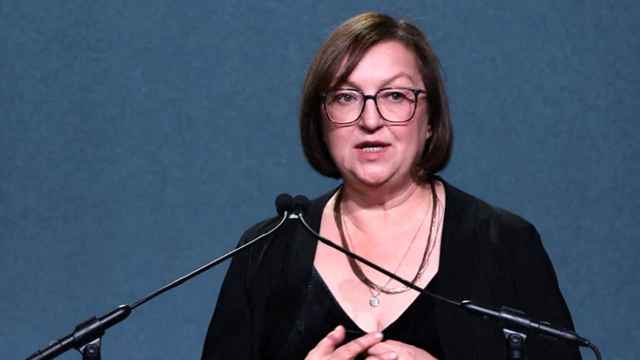A British lawmaker attended the Pussy Riot trial on Monday "to give a bit of extra attention" to the three members of the all-female punk band who face up to seven years in prison for a church performance in which they denounced President Vladimir Putin and Patriarch Kirill.
Meanwhile, the judge refused to allow the defense to question the co-author of an expert opinion that the February performance at Moscow's Christ the Savior Cathedral was motivated by religious hatred. The criminal charge against the band is based on that statement.
The judge also rejected for a seventh time a request by the defendants and their lawyers to recuse herself from the trial over multiple violations of their rights.
The verdict for the three arrested band members — Maria Alyokhina, 24; Nadezhda Tolokonnikova, 22; and Yekaterina Samutsevich, 30 — on felony charges of hooliganism motivated by religious hatred is expected later this week, defense lawyers said. The women have been in custody since early March.
British Shadow Chancellor Kerry McCarthy said she wanted to "give a bit of extra attention" to the trial because she was "quite concerned by the fact that [the defendants] were imprisoned for what didn't seem like a serious matter and couldn't see their children."
"It seems strange to me that they have been charged with this offense," she told The Moscow Times during a break inside the courtroom at Moscow's Khamovnichesky District Court. "In the U.K., they would have been charged with a breach of peace and told off or fined."
When McCarthy started following the trial, she saw that the defendants "weren't able to call their witnesses" and that other violations of their rights were taking place, she said.
Asked whether she saw the trial as politically motivated, she replied, "Everything I've read about it would lead me to think that." But she noted that she wouldn't like to express her personal opinion of whether it was "a political thing or not."
McCarthy also was tweeting about the trial Monday and said she intended to write some articles about the trial upon returning home.
Defendants and their lawyers asked the judge on Monday to summon the expert opinion's co-author, lawyer Igor Ponkin, so they could question him in court about the statement.
That opinion came to "false conclusions" that the band's performance was motivated by religious hatred "based on unreliable data," defense lawyer Violetta Volkova told the court.
All three specialists who carried out the controversial "psycho-linguistic" opinion were hired by the investigators.
Two other expert opinions carried out upon the request of the defense lawyers rule out religious hatred in the February performance.
If investigators had not suspected religious hatred in the band's performance, the defendants could have been slapped with administrative charges of petty hooliganism, punishable by an arrest of up to 15 days, or a fine of several thousand rubles.
Volkova questioned the opinion that the defendants violated public order, which is the legal definition of hooliganism. She argued that they could only have violated church rules, which is not punishable by law. Even the band's violation of church rules was arguable because many traditions of behavior at a church are not spelled out in any documents, she said.
Volkova also pointed out that the expert opinion was partially based on the video clip, which is a compilation of the band's performances in at least two churches, and that the sound was added to the video later.
In addition, Volkova noted that Ponkin was a "committed Christian" and "couldn't have been totally impartial when he formed this opinion," she said.
Another defense lawyer, Mark Feigin, told the court that Ponkin had a "connection" to the lawyer of one of the plaintiffs in the trial, which violated the Code of Criminal Procedures.
Feigin also wondered why a lawyer had written a psycho-linguistic opinion, being an expert in law, not psychology or linguistics.
The defendants and their lawyers jointly spent about an hour citing multiple arguments for questioning Ponkin in court. Still, the prosecutor in the trial, Alexander Nikiforov, told the court afterward that "the defense has presented no grounds for summoning Ponkin." The judge, Marina Syrova, and the three plaintiffs' lawyers sided with the prosecutor.
The judge and lawyers of both parties also listened to the defendants' pleas about the charges brought against them and questioned the defendants Monday.
Tolokonnikova said people "mustn't be tried for breaking church rules" and that it was "absurd to say that someone wanted to express hostility to religion through a prayer," Pyotr Verzilov, who maintains the Twitter blog of the Voina art group, wrote on that blog.
Pussy Riot has claimed that the February performance was a "punk prayer."
Alyokhina said Putin's decision in fall 2011 to run for president in March forced her and her friends to create Pussy Riot.
"After multiple calls by Patriarch Kirill to vote for Putin, we were forced to include the main symbol of the patriarch's political clout — the Christ the Savior Cathedral — into the cycle of our performances," Samutsevich told the court.
She explained that by its performance, the band wanted to "contribute to the development of civil protest" in Russia but didn't want to offend believers and specifically performed at a time when there were no services in the cathedral.
"I find the charges to be absurd and the opening of the criminal case illegal," Samutsevich said.
Meanwhile, U.S. pop star Madonna, who Pussy Riot lawyers hope will speak up on behalf of their clients, declined to take questions about the punk group during a visit Monday evening to a fitness center that she owns in Moscow. But Madonna, who will perform concerts in Moscow and St. Petersburg this week, said in an interview with The Associated Press that she hoped the defendants would be released. "I'm against censorship, so I hope that the judge is lenient with them and that they are freed soon," she said.
Jailed tycoon Mikhail Khodorkovsky came out in support of the band on Monday, calling the trial "a disgrace of a great country, a country of world-known humanists and scientists, which is quickly turning into a backward Asian province," The Associated Press reported.
He speculated that the judge may be pushing for a verdict before the end of the London Olympics so that "our disgrace would not sound as loud as it could."
Staff writer Alexander Bratersky contributed to this report.
A Message from The Moscow Times:
Dear readers,
We are facing unprecedented challenges. Russia's Prosecutor General's Office has designated The Moscow Times as an "undesirable" organization, criminalizing our work and putting our staff at risk of prosecution. This follows our earlier unjust labeling as a "foreign agent."
These actions are direct attempts to silence independent journalism in Russia. The authorities claim our work "discredits the decisions of the Russian leadership." We see things differently: we strive to provide accurate, unbiased reporting on Russia.
We, the journalists of The Moscow Times, refuse to be silenced. But to continue our work, we need your help.
Your support, no matter how small, makes a world of difference. If you can, please support us monthly starting from just $2. It's quick to set up, and every contribution makes a significant impact.
By supporting The Moscow Times, you're defending open, independent journalism in the face of repression. Thank you for standing with us.
Remind me later.


